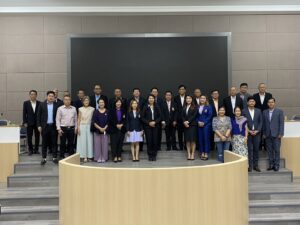[ad_1]
Swazi Secrets exposes the role the tiny kingdom of Eswatini, the last absolute monarchy in Africa, may have played in the regional illicit economy.
Swazi Secrets is a cross-border investigation that reveals Eswatini’s unexplored role as a possible conduit in southern Africa’s gold smuggling economy — and how the absolute monarchy’s weak anti-money laundering controls enable figures close to the royal family to benefit from proximity to the king.
The project is based on a leak of more than 890,000 internal records from the Eswatini Financial Intelligence Unit. These documents were obtained by Distributed Denial of Secrets, a nonprofit devoted to publishing and archiving leaks, which shared them with the International Consortium of Investigative Journalists. ICIJ coordinated a team of 38 journalists across 11 countries to explore the documents.
The leak is the largest of its kind from a financial intelligence unit in an African country. The documents include bank records, police investigation reports, court affidavits, and confidential exchanges between government agencies within southern Africa. The records also include details about banks in African countries and beyond that have facilitated financial transactions for people and companies suspected of criminal activity.
Some records relate to prominent individuals, including members of the royal family of Eswatini. The investigation highlights the extraordinary role of the king and some key allies in supporting a new bank in a years-long tussle with the regulator, the Central Bank of Eswatini.
Swazi Secrets also shows a potential connection between Eswatini to the larger gold smuggling economy in southern Africa and beyond. The documents show millions of dollars passed from a notorious “cash-in-transit” company in South Africa through a gold refining company in Eswatini, then on to Dubai. This Eswatini company was set up by two business partners, including a son-in-law of Eswatini’s king, Mswati III. Authorities at the EFIU and Eswatini’s central bank were concerned that this gold refining company — and another later set up by one of the partners — were exploiting loopholes to evade taxes, illegally move money abroad and move illicit funds through the kingdom.
As the last remaining absolute monarch in Africa, King Mswati III holds veto power over all branches of government and is constitutionally immune from prosecution. The royal family has interests in various facets of Eswatini’s economy. The king and his large family — reportedly including 11 wives and more than 30 children — have a reputation for flaunting their lavish lifestyles, which critics say shows a callous disregard for the suffering of his subjects, who mostly live in impoverished rural areas and struggle to find work.
The ICIJ Team
Director: Gerard Ryle

Sign up for free AllAfrica Newsletters
Get the latest in African news delivered straight to your inbox
Success!
Almost finished…
We need to confirm your email address.
To complete the process, please follow the instructions in the email we just sent you.
Error!
There was a problem processing your submission. Please try again later.
Managing editor: Fergus Shiel
Deputy managing editor: Annys Shin
Senior editors: Whitney Joiner, David Rowell, Dean Starkman
Head of data and research: Delphine Reuter
Reporters: Micah Reddy, Warren Thompson, Nicole Sadek
Data reporters: Jelena Cosic, Karrie Kehoe, Denise Ajiri
Associate editors and fact-checkers: Richard H.P. Sia, Kathleen Cahill
Copy editor: Angie Wu
Head of digital and product: Hamish Boland-Rudder
Digital editor: Joanna Robin
Digital producer: Carmen Molina Acosta
Social media producer: Daniela Vivas Labrador
Web developer: Antonio Cucho
Chief technology officer: Pierre Romera Zhang
Technology team: Caroline Desprat, Soline Ledésert, Miguel Fiandor Gutiérrez, Bruno Thomas, Maxime Vanza Lutonda, Whitney Awanayah, Javier Ladrón de Guevara, Jorge González, Carolina Verónica López Cotán and Clément Doumouro.
Images: Sindiso Nyoni (illustration), Yeshiel Panchia (photography)
Training manager: Jelena Cosic
[ad_2]
Source link




